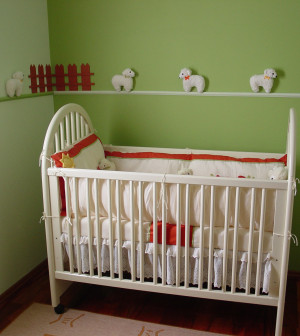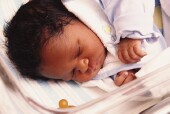- Could Artificial Sweeteners Be Aging the Brain Faster?
- Techniques for Soothing Your Nervous System
- Does the Water in Your House Smell Funny? Here’s Why
- Can a Daily Dose of Apple Cider Vinegar Actually Aid Weight Loss?
- 6 Health Beverages That Can Actually Spike Your Blood Sugar
- Treatment Options for Social Anxiety Disorder
- Understanding the Connection Between Anxiety and Depression
- How Daily Prunes Can Influence Cholesterol and Inflammation
- When to Take B12 for Better Absorption and Energy
- Epsom Salts: Health Benefits and Uses
Babies Who ‘Resettle’ on Their Own Get Better Sleep


Infants who “resettle” after waking up are more likely to sleep through the night, a new study suggests.
British researchers made overnight infrared video recordings of just over 100 infants when they were 5 weeks and 3 months old. This is the time when parents begin to hope their baby will sleep more and cry less at night, the researchers noted.
On average, the infants’ length of sleep increased from just over two hours at five weeks to 3.5 hours at three months. Only 10 percent of the infants slept continuously for 5 or more hours at five weeks, compared to 45 percent at three months.
At both ages, about one-fourth of the infants awoke and resettled themselves at least once during the night. Resettling means they went back to sleep without their parents’ help.
Sixty-seven percent of infants who resettled themselves at five weeks slept continuously for at least five hours at three months. Just 38 percent of those who didn’t resettle themselves at five weeks slept five hours continuously, the researchers said.
The study was published in the June issue of the Journal of Developmental & Behavioral Pediatrics.
“Infants are capable of resettling themselves back to sleep by three months of age,” wrote Ian St. James-Roberts and colleagues of the University of London. “Both autonomous resettling and prolonged sleeping are involved in ‘sleeping through the night’ at an early age.”
The findings show “the need for studies of how arousal, waking and resettling develop into sustained sleeping, and of how environmental factors support these endogenous and behavioral processes,” St James-Roberts said in a journal news release.
If other studies confirm these findings, they may help resolve the puzzle of why so many healthy infants have sleep problems, he said.
More information
The American Academy of Pediatrics has more about sleep.
Source: HealthDay
Copyright © 2026 HealthDay. All rights reserved.










